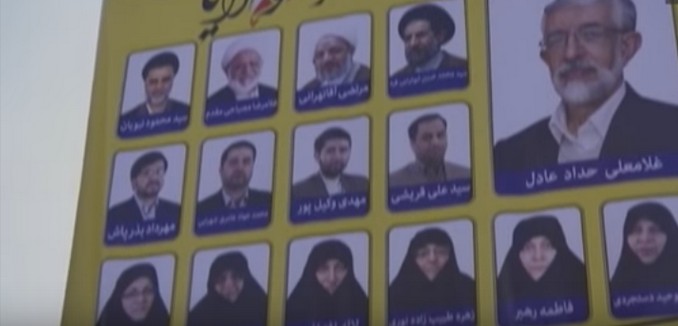The Iranian elections did not result in the victory of moderates or reformists, several analysts have recently argued. Reuel Marc Gerecht, a senior fellow at the Foundation for Defense of Democracies (FDD), explained on Friday that true reformers were wiped out by the Tehran regime in 2009 – they “were silenced, imprisoned, exiled, murdered and banned from politics.” He continued, “What we have left in the Islamic Republic’s theocratically managed democracy, in which parliament has no real power, are regime-loyal laymen and mullahs who are all Islamic revolutionaries.” When there were student protests in 1999, Iranian President Hassan Rouhani, who has been touted as a moderate and reformer, “gave a fire-breathing speech threatening the students with death.”
In a similar vein, Eli Lake observed in the wake of the elections, “To understand the degree of Iran’s political stagnation, consider this bit of history. When Ali Akbar Hashemi Rafsanjani was president of Iran in the 1990s, the journalist Akbar Ganji documented Rafsanjani’s role in the murder of dissidents and intellectuals. In 2013, Ganji — who is himself living in exile — endorsed Rafsanjani for the presidency, in part because the choices were already so narrowed by the unelected part of the Iranian state.”
Karim Sadjadpour, a senior associate at the Carnegie Endowment for International Peace, said of the elections, “The forces of darkness remain pretty firmly entrenched. We shouldn’t underestimate the population’s will for change or underestimate the means of the Iranian regime to crush change seekers.”
Saeed Ghasseminejad, an associate fellow at FDD, also wrote on Friday that the more important of the two elections that took place was that for the Assembly of Experts, a body that appoints the Supreme Leader, and not for the Iranian parliament, whose bills must go through the Guardian Council, an unelected body dedicated to preserving the Islamic revolution and answerable to the Supreme Leader. Eighty percent of candidates for the Assembly, most of whom were self-described reformers, were disqualified by the Guardian Council and hardliners won 75% of the Assembly’s seats. Within the parliament, reformists, who had 99% of their candidates disqualified, were so desperate that they filled their party lists with hardliners, severely weakening any supposedly reform list. Ghasseminejad continued, “Labeling radicals as ‘moderates’ or ‘reformists’ does not make them so.”
Ray Takeyh, a former Iran advisor to former Secretary of State Hillary Clinton, wrote before the elections that “Iranian politics have been reduced to a coalition of hardliners and centrists who agree far more than they disagree. On crucial foreign policy issues, such as projection of power in the Middle East and aiding the regime of Bashar al-Assad in Syria, there is a rough consensus across the political spectrum.” Takeyh made clear that even the Assembly of Experts has limited impact and that, ultimately, real power in Iran lies with unelected bodies and individuals, such as the Guardian Council and Supreme Leader Ali Khamenei.
Indeed, last month former Under Secretary of State Wendy Sherman, the lead negotiator for the United States in the Iran nuclear deal, made it explicitly clear that in Iranian politics there are no moderates: “There are hardliners in Iran, and then there are hard-hardliners. Rouhani is not a moderate, he is a hardliner.”
Ben Cohen, senior editor of TheTower.org, wrote on Sunday:
With Rouhani in power, the traditional understanding of what constitutes a “moderate” has been stretched beyond recognition. To be a “moderate” in Iran these days, you don’t have to disavow the regime’s military and operational backing, in concert with Russia, for the deranged Bashar al-Assad dictatorship in Syria. You don’t have to pledge that $150 billion in recouped funds from sanctions relief will be spent on public health, or children’s literacy programs, instead of Shi’a terrorist organizations in Iraq and Lebanon. You don’t have to stop roaring slogans like “Death to Israel!” and “Death to America!” at public demonstrations. All that is required for exemption from “hardliner” status is a broad show of support for the nuclear deal.
[Photo: euronews (in English) / YouTube ]




